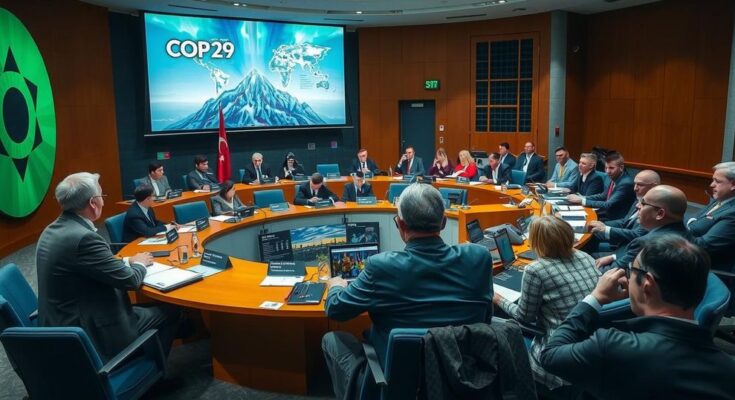COP29 highlighted challenges in climate finance, revealing fossil fuel interests’ influence on policy. Ecuador’s history underscores the struggle for funding ecological initiatives. Colombia and Brazil’s recent efforts offer hope for securing international support. Upcoming elections and shifting political landscapes may present opportunities for renewed commitment to climate action in developing nations.
The aftermath of COP29 has elicited significant concern regarding climate finance and the impact of fossil fuel interests on environmental policies. As demonstrated by the actions of Ecuador, past attempts to secure funding for ecological initiatives often falter in the face of financial challenges, resulting in a retreat from commitments to conservation. Such scenarios reveal the ongoing struggle developing countries experience in seeking support for sustainable projects amid competing economic pressures.
Colombia’s recent initiatives under President Gustavo Petro highlight the potential for innovative environmental policies, with a campaign aiming to secure $40 billion to transition away from coal and petroleum. However, upcoming elections and growing fiscal deficits present considerable hurdles that may impede progress.
Brazil’s leadership at the next climate summit in Belém presents a vital opportunity for securing financial commitments that could shift the momentum towards a greener future. The endeavor to build international support for climate projects rests on proactive dialogues among developed nations, particularly as leaders reassess their financial commitments amid pressing domestic concerns.
Global economic conditions continuously evolve; countries such as Japan and Germany may reassess their climate finance pledges, presenting opportunities for enhanced international collaboration. Furthermore, political shifts in nations like the United Kingdom and Australia could foster a renewed commitment to address climate change.
Despite the setbacks and challenges faced, the collective efforts of progressive leaders, compelling environmental policies, and collaborative international strategies offer a glimmer of hope for effective climate action in the future.
The COP29 summit, held recently, exposed the weaknesses in global climate finance, revealing how fossil fuel interests often dominate the conversation. Previous efforts, such as Ecuador’s attempt to leave oil reserves untouched in exchange for international funding, elucidated the struggles faced by developing nations seeking financial support for ecological preservation. Moving forward, coalitions formed during these global summits are essential for advancing sustainable practices and financing mechanisms that can withstand political and economic shifts.
In summary, while COP29 revealed critical gaps in climate finance, it also illuminated pathways for future collaboration among nations. Efforts in Colombia and Brazil illustrate a persistent commitment to phasing out fossil fuels amidst financial uncertainties. Given the context of international politics and finance, it is crucial that developing countries leverage opportunities to foster partnerships that address climate financing, paving the way for effective and sustainable environmental actions in the coming years.
Original Source: www.independent.co.uk




